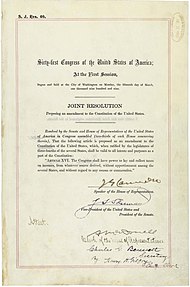
Back Sixtēoþa Gebētung þære Grundgesetnesse þāra Geānedra Rīca American ANG Шаснаццатая папраўка да Канстытуцыі ЗША Byelorussian Setzena esmena de la Constitució dels Estats Units Catalan 16. Zusatzartikel zur Verfassung der Vereinigten Staaten German Decimosexta Enmienda a la Constitución de los Estados Unidos Spanish Ameerika Ühendriikide põhiseaduse kuueteistkümnes parandus Estonian متمم شانزدهم قانون اساسی ایالات متحده آمریکا Persian Yhdysvaltain perustuslain 16. lisäys Finnish Seizième amendement de la Constitution des États-Unis French התיקון ה-16 לחוקת ארצות הברית HE
| This article is part of a series on the |
| Constitution of the United States |
|---|
 |
| Preamble and Articles |
| Amendments to the Constitution |
|
Unratified Amendments: |
| History |
| Full text |

The Sixteenth Amendment (Amendment XVI) to the United States Constitution allows Congress to levy an income tax without apportioning it among the states on the basis of population. It was passed by Congress in 1909 in response to the 1895 Supreme Court case of Pollock v. Farmers' Loan & Trust Co. The Sixteenth Amendment was ratified by the requisite number of states on February 3, 1913, and effectively overruled the Supreme Court's ruling in Pollock.
Prior to the early 20th century, most federal revenue came from tariffs rather than taxes, although Congress had often imposed excise taxes on various goods. The Revenue Act of 1861 had introduced the first federal income tax, but that tax was repealed in 1872. During the late nineteenth century, various groups, including the Populist Party, favored the establishment of a progressive income tax at the federal level. These groups believed that tariffs unfairly taxed the poor, and they favored using the income tax to shift the tax burden onto wealthier individuals. The 1894 Wilson–Gorman Tariff Act contained an income tax provision, but the tax was struck down by the Supreme Court in the case of Pollock v. Farmers' Loan & Trust Co. In its ruling, the Supreme Court did not hold that all federal income taxes were unconstitutional, but rather held that income taxes on rents, dividends, and interest were direct taxes and thus had to be apportioned among the states on the basis of population.
For several years after Pollock, Congress did not attempt to implement another income tax, largely due to concerns that the Supreme Court would strike down any attempt to levy an income tax. In 1909, during the debate over the Payne–Aldrich Tariff Act, Congress proposed the Sixteenth Amendment to the states. Though conservative Republican leaders had initially expected that the amendment would not be ratified, a coalition of Democrats, progressive Republicans, and other groups ensured that the necessary number of states ratified the amendment. Shortly after the amendment was ratified, Congress imposed a federal income tax with the Revenue Act of 1913. The Supreme Court upheld that income tax in the 1916 case of Brushaber v. Union Pacific Railroad Co., and the federal government has continued to levy an income tax since 1913.